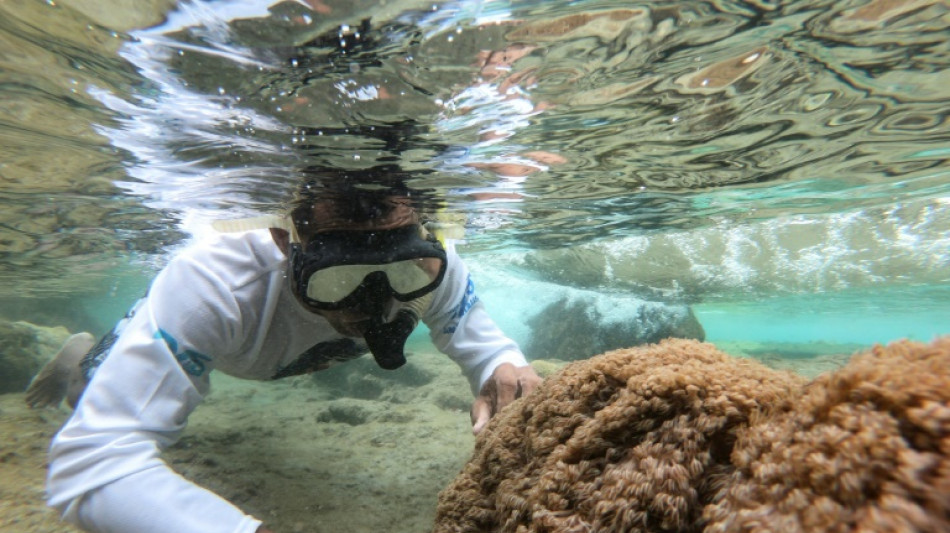
-
 Asian markets rally with Wall St as rate hopes rise, AI fears ease
Asian markets rally with Wall St as rate hopes rise, AI fears ease
-
Jailed Malaysian ex-PM Najib loses bid for house arrest

-
 Banned film exposes Hong Kong's censorship trend, director says
Banned film exposes Hong Kong's censorship trend, director says
-
Duffy, Patel force West Indies collapse as NZ close in on Test series win

-
 Australian state pushes tough gun laws, 'terror symbols' ban after shooting
Australian state pushes tough gun laws, 'terror symbols' ban after shooting
-
A night out on the town during Nigeria's 'Detty December'

-
 US in 'pursuit' of third oil tanker in Caribbean: official
US in 'pursuit' of third oil tanker in Caribbean: official
-
CO2 soon to be buried under North Sea oil platform

-
 Steelers edge Lions as Bears, 49ers reach playoffs
Steelers edge Lions as Bears, 49ers reach playoffs
-
India's Bollywood counts costs as star fees squeeze profits

-
 McCullum admits errors in Ashes preparations as England look to salvage pride
McCullum admits errors in Ashes preparations as England look to salvage pride
-
Pets, pedis and peppermints: When the diva is a donkey

-
 'A den of bandits': Rwanda closes thousands of evangelical churches
'A den of bandits': Rwanda closes thousands of evangelical churches
-
Southeast Asia bloc meets to press Thailand, Cambodia on truce

-
 As US battles China on AI, some companies choose Chinese
As US battles China on AI, some companies choose Chinese
-
AI resurrections of dead celebrities amuse and rankle

-
 Steelers receiver Metcalf strikes Lions fan
Steelers receiver Metcalf strikes Lions fan
-
Morocco coach 'taking no risks' with Hakimi fitness

-
 Gang members given hundreds-years-long sentences in El Salvador
Gang members given hundreds-years-long sentences in El Salvador
-
Chargers, Bills edge closer to playoff berths

-
 Gang members given hundred-years-long sentences in El Salvador
Gang members given hundred-years-long sentences in El Salvador
-
Hosts Morocco off to winning start at Africa Cup of Nations

-
 No jacket required for Emery as Villa dream of title glory
No jacket required for Emery as Villa dream of title glory
-
Amorim fears United captain Fernandes will be out 'a while'

-
 Nigerian government frees 130 kidnapped Catholic schoolchildren
Nigerian government frees 130 kidnapped Catholic schoolchildren
-
Captain Kane helps undermanned Bayern go nine clear in Bundesliga

-
 Captain Kane helps undermanned Bayern go nine clear
Captain Kane helps undermanned Bayern go nine clear
-
Rogers stars as Villa beat Man Utd to boost title bid

-
 Barca strengthen Liga lead at Villarreal, Atletico go third
Barca strengthen Liga lead at Villarreal, Atletico go third
-
Third 'Avatar' film soars to top in N. American box office debut

-
 Third day of Ukraine settlement talks to begin in Miami
Third day of Ukraine settlement talks to begin in Miami
-
Barcelona's Raphinha, Yamal strike in Villarreal win

-
 Macron, on UAE visit, announces new French aircraft carrier
Macron, on UAE visit, announces new French aircraft carrier
-
Barca's Raphinha, Yamal strike in Villarreal win

-
 Gunmen kill 9, wound 10 in South Africa bar attack
Gunmen kill 9, wound 10 in South Africa bar attack
-
Allegations of new cover-up over Epstein files

-
 Atletico go third with comfortable win at Girona
Atletico go third with comfortable win at Girona
-
Schwarz breaks World Cup duck with Alta Badia giant slalom victory

-
 Salah unaffected by Liverpool turmoil ahead of AFCON opener - Egypt coach
Salah unaffected by Liverpool turmoil ahead of AFCON opener - Egypt coach
-
Goggia eases her pain with World Cup super-G win as Vonn takes third

-
 Goggia wins World Cup super-G as Vonn takes third
Goggia wins World Cup super-G as Vonn takes third
-
Cambodia says Thai border clashes displace over half a million

-
 Kremlin denies three-way US-Ukraine-Russia talks in preparation
Kremlin denies three-way US-Ukraine-Russia talks in preparation
-
Williamson says 'series by series' call on New Zealand Test future

-
 Taiwan police rule out 'terrorism' in metro stabbing
Taiwan police rule out 'terrorism' in metro stabbing
-
Australia falls silent, lights candles for Bondi Beach shooting victims

-
 DR Congo's amputees bear scars of years of conflict
DR Congo's amputees bear scars of years of conflict
-
Venison butts beef off menus at UK venues

-
 Cummins, Lyon doubts for Melbourne after 'hugely satsfying' Ashes
Cummins, Lyon doubts for Melbourne after 'hugely satsfying' Ashes
-
'It sucks': Stokes vows England will bounce back after losing Ashes


Deadly invader devastating Venezuelan coral reefs
An ominous shadow in the turquoise Caribbean waters off Venezuela comes from a deadly intruder -- a soft coral that experts say has caused one of the most destructive habitat invasions on record anywhere.
The Unomia stolonifera, native to Indonesia and the Indo-Pacific, is a pinkish type of pulse coral so called for its dance-like movements in the ocean currents.
It is a popular aquarium ornament -- pretty to look at and hardy -- with a single polyp fetching as much as $80 to $120.
But it is also a killer -- settling on native hard corals, rocks and even seagrass which it suffocates and replaces, ultimately destroying entire ecosystems.
Off Venezuela's north coast, Unomia dominates the ocean floor landscape after being introduced through the illegal aquarium trade around 20 years ago.
"This is an ecological catastrophe," said marine biologist Juan Pedro Ruiz-Allais, director of Project Unomia, named after the invader he has spent years investigating.
Fish stocks are drastically decreasing in the waters off Venezuela as native reefs, which serve as nurseries and feeding grounds, die off, he told AFP.
"When the reef dies, when it is covered by the Unomia stolonifera, a disruption of the food chain occurs," said the biologist.
"It is a social, food security, and economic problem because the livelihood of fishermen is compromised."
- 'Nobody knew' -
When Ruiz-Allais first came across the invader in 2007, it was an unknown species in the Caribbean and even the Atlantic, he recalled. "Nobody knew what it was."
It was first spotted in the Mochima National Park, a gorgeous archipelago covering more than 94,000 hectares, and has since been found to have colonized most of those islands.
The first scientific report was published in 2014, and the coral was initially classified as a member of the broad Xeniidae family before it was finally categorized in 2021 as Unomia stolonifera.
From Mochima, it has spread west and east in the Caribbean Sea.
Off the northern state of Anzoategui, it has taken over the equivalent of 300 football stadiums.
The coral is spread by fishing nets, anchors, and ship ballast water.
"It is a great colonizer," Gustavo Carrasquel, director of the Azul Ambientalistas, an environmental NGO, told AFP.
- 'Unprecedented' -
The threat extends beyond Venezuela's borders: officials say Unomia traces have been found near the islands of Aruba and Curacao, and in waters off Colombia and Brazil -- where it became attached to an oil rig but was controlled.
"It is a problem that will affect the rest of the Caribbean," said Ruiz-Allais.
But nowhere has it been more destructive than in Venezuela.
"It is an unprecedented case," said Project Unomia coordinator Mariano Onoro.
Fishermen and tour operators, concerned about the invasive coral's rapid propagation, have resorted to manual extraction.
But experts say this is not advised, because broken-off fragments are transported by the tides, settling to create yet more colonies.
The privately funded Project Unomia has developed an extraction machine with a group of engineers that is awaiting government approval for testing.
Venezuela's Institute for Scientific Research and the ministry of eco-socialism have launched an investigation into the coral's rapid spread but have yet to come up with a solution.
For now, the magnitude of the problem is such that the invader's elimination appears impossible.
"What we can do is recover some areas and control it," said Onoro.
O.Norris--AMWN



